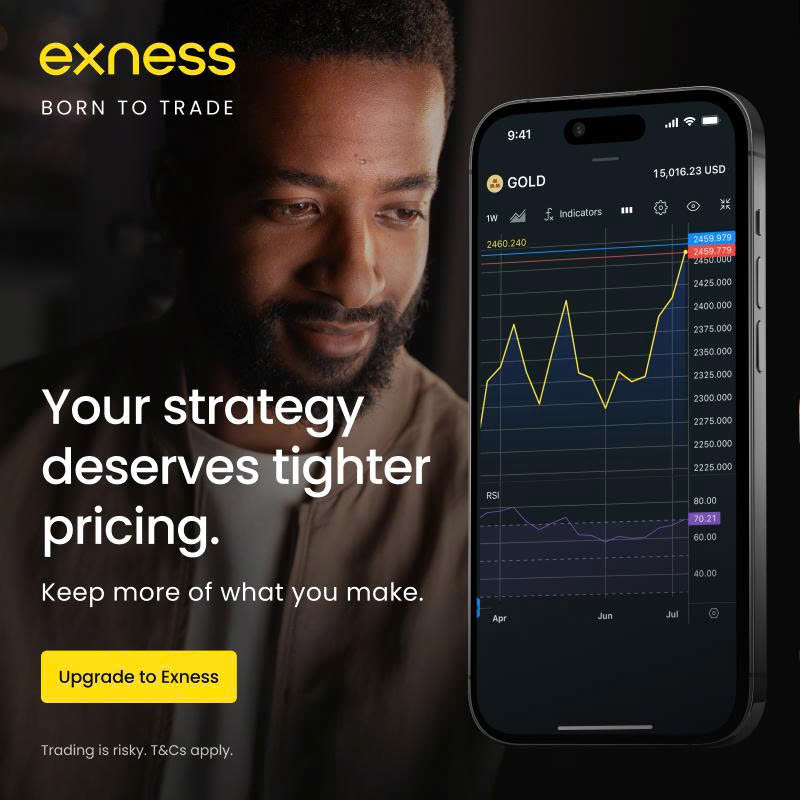
9 minute read
How to Become a Forex Broker in South Africa: A Step-by-Step Guide
from Exness
by Exness Blog
The forex market, with its daily trading volume exceeding $7 trillion, is one of the most dynamic financial markets in the world. South Africa, as a growing financial hub in Africa, offers immense opportunities for aspiring forex brokers. Becoming a forex broker in South Africa is an exciting yet challenging journey that requires careful planning, regulatory compliance, and a deep understanding of the industry. If you're considering entering this lucrative field, this comprehensive guide will walk you through the steps to become a successful forex broker in South Africa while ensuring compliance with local regulations and building a reputable business.
Top 4 Best Forex Brokers in South Africa
1️⃣ Exness: Open An Account or Visit Brokers 🏆
2️⃣ XM: Open An Account or Visit Brokers 💥
3️⃣ JustMarkets: Open An Account or Visit Brokers ✅
4️⃣ Quotex: Open An Account or Visit Brokers 🌐
Why Become a Forex Broker in South Africa?
South Africa’s forex market is thriving, driven by increasing financial literacy, a tech-savvy population, and access to global trading platforms. The country’s well-regulated financial sector, overseen by the Financial Sector Conduct Authority (FSCA), provides a stable environment for forex brokers. Here are some reasons why starting a forex brokerage in South Africa is a smart move:
· Growing Market Demand: South Africans are increasingly interested in forex trading, creating a demand for reliable brokers.
· Regulatory Credibility: The FSCA’s stringent regulations enhance trust in South African brokers.
· Strategic Location: South Africa serves as a gateway to the African market, attracting international clients.
· Technological Advancements: Access to advanced trading platforms and fintech solutions makes it easier to establish a brokerage.
Ready to dive into the world of forex brokerage? Let’s explore the step-by-step process to get started.
Step 1: Understand the Forex Brokerage Industry
Before launching your forex brokerage, you need a solid understanding of the industry. A forex broker acts as an intermediary between retail traders and the global forex market, facilitating currency trades and providing trading platforms, tools, and support. In South Africa, brokers operate under strict regulations to ensure transparency and client protection.
Key Responsibilities of a Forex Broker
· Providing access to trading platforms like MetaTrader 4 or 5.
· Offering competitive spreads and leverage options.
· Ensuring client funds are secure and segregated.
· Providing educational resources and customer support.
· Complying with local and international regulations.
Types of Forex Brokers
· Market Maker: Acts as the counterparty to clients’ trades, setting their own prices.
· STP (Straight Through Processing): Routes client orders directly to liquidity providers.
· ECN (Electronic Communication Network): Connects traders to a network of liquidity providers for transparent pricing.
Understanding these models will help you decide which type of brokerage aligns with your business goals.
Step 2: Conduct Market Research
To succeed as a forex broker in South Africa, thorough market research is essential. Analyze the local market to identify your target audience, competitors, and unique selling points (USPs). Key areas to focus on include:
· Target Audience: Are you targeting beginner traders, experienced investors, or institutional clients?
· Competitor Analysis: Study established brokers like FXTM, Exness, or local players to understand their offerings, strengths, and weaknesses.
· Market Trends: Stay updated on trends like mobile trading, copy trading, and AI-driven trading tools.
· Client Needs: South African traders often prioritize low fees, user-friendly platforms, and reliable customer support.
Use tools like Google Trends, SEMrush, or Ahrefs to identify popular forex-related keywords in South Africa, such as “forex trading South Africa” or “best forex broker SA,” to tailor your services and marketing strategy.
Step 3: Obtain Regulatory Approval from the FSCA
The Financial Sector Conduct Authority (FSCA) is the primary regulatory body overseeing forex brokers in South Africa. Operating without FSCA authorization is illegal and can damage your reputation. Here’s how to secure the necessary licenses:
Apply for an FSCA License
To become a licensed forex broker, you need to apply for a Financial Services Provider (FSP) license with a Category I authorization for forex trading. The process involves:
· Business Registration: Register your company with the Companies and Intellectual Property Commission (CIPC) as a private company or other legal entity.
· Minimum Capital Requirements: The FSCA requires a minimum capital amount to ensure financial stability. This varies depending on the scope of your operations but typically ranges from ZAR 1 million to ZAR 5 million.
· Fit and Proper Requirements: Key personnel, including directors and compliance officers, must meet the FSCA’s “fit and proper” criteria, which assess integrity, competence, and financial soundness.
· Submit Application: Provide detailed documentation, including a business plan, compliance policies, and proof of capital. The FSCA reviews applications within 3–6 months.
· Compliance with FAIS Act: Ensure adherence to the Financial Advisory and Intermediary Services Act (FAIS), which governs financial service providers in South Africa.
Ongoing Compliance
Once licensed, you must:
· Maintain segregated client accounts to protect funds.
· Submit regular financial reports to the FSCA.
· Implement anti-money laundering (AML) and know-your-customer (KYC) policies.
· Conduct regular audits to ensure compliance.
Obtaining an FSCA license establishes credibility and builds trust with clients, setting you apart from unregulated brokers.
A well-crafted business plan is the foundation of your forex brokerage. It outlines your goals, strategies, and financial projections. Key components include:
· Mission and Vision: Define your brokerage’s purpose and long-term objectives.
· Revenue Model: Decide how you’ll earn revenue (e.g., spreads, commissions, or account fees).
· Target Market: Specify your target audience and geographic focus.
· Marketing Strategy: Plan how you’ll attract clients through digital marketing, partnerships, or referral programs.
· Financial Projections: Estimate startup costs, operational expenses, and revenue for the first 3–5 years.
Estimated Startup Costs
· Licensing Fees: ZAR 10,000–50,000 for FSCA application and related costs.
· Technology: ZAR 100,000–500,000 for trading platforms, website development, and CRM systems.
· Office Setup: ZAR 50,000–200,000 for office space, equipment, and staff.
· Marketing Budget: ZAR 50,000–100,000 for initial campaigns.
· Liquidity Provider: Variable costs depending on partnerships.
A detailed business plan will guide your operations and attract potential investors or partners.

💥 Trade with Exness now: Open An Account or Visit Brokers 🏆
Step 5: Partner with Liquidity Providers and Technology Vendors
To offer competitive trading conditions, you need reliable liquidity providers and trading platforms.
Liquidity Providers
Liquidity providers (LPs) supply the pricing and liquidity for your clients’ trades. Choose reputable LPs like LMAX Exchange, Saxo Bank, or Integral. Factors to consider:
· Competitive spreads and low latency.
· Access to deep liquidity pools.
· Support for multiple asset classes (forex, CFDs, commodities).
· Integration with your chosen trading platform.
Trading Platforms
Most traders prefer platforms like MetaTrader 4 (MT4) or MetaTrader 5 (MT5) due to their user-friendly interfaces and advanced features. Alternatively, you can develop a proprietary platform, though this is costlier. Ensure your platform offers:
· Mobile and web-based trading.
· Advanced charting tools and indicators.
· Automated trading capabilities (e.g., Expert Advisors for MT4/MT5).
· Secure data encryption.
Additional Technology
· CRM System: Manage client relationships and track leads.
· Payment Gateways: Offer secure deposit and withdrawal options, including local methods like EFT and mobile payments.
· Website: Build a professional, website with clear information about your services, fees, and regulations.
Step 6: Set Up Risk Management and Compliance Systems
Risk management is critical to protect your brokerage and clients. Implement the following:
· Segregated Accounts: Store client funds in separate accounts at reputable banks to ensure security.
· Risk Management Tools: Offer negative balance protection and stop-loss orders to minimize client losses.
· Compliance Policies: Develop robust AML and KYC procedures to verify client identities and prevent fraud.
· Cybersecurity: Use SSL encryption, two-factor authentication, and regular security audits to protect client data.
Hire a qualified compliance officer to oversee regulatory adherence and ensure your brokerage operates within FSCA guidelines.
Step 7: Build a Strong Brand and Marketing Strategy
To stand out in South Africa’s competitive forex market, you need a strong brand and effective marketing strategy.
Branding
· Unique Value Proposition (UVP): Highlight what sets you apart, such as low spreads, fast execution, or exceptional customer support.
· Professional Website: Create a user-friendly, mobile-optimized website with clear calls-to-action (CTAs).
· Logo and Design: Invest in a professional logo and consistent branding across all platforms.
Marketing Strategies
· Content Marketing: Publish blog posts, videos, and eBooks on forex trading tips, market analysis, and beginner guides.
· Social Media: Engage with traders on platforms like Twitter (X), LinkedIn, and Instagram. Share market updates and trading insights.
· PPC Advertising: Run targeted Google Ads campaigns to attract local traders.
· Partnerships: Collaborate with forex influencers, trading educators, or affiliate marketers to expand your reach.
Local Focus
Tailor your marketing to South African traders by:
· Offering content in English and local languages like Afrikaans or Zulu.
· Highlighting FSCA regulation to build trust.
· Providing educational resources for beginners, as many South African traders are new to forex.
Step 8: Launch Your Brokerage and Attract Clients
Once your infrastructure is in place, it’s time to launch your brokerage. Start with a soft launch to test your systems, followed by a full-scale launch with a marketing campaign. Key steps include:
· Demo Accounts: Offer demo accounts to attract new traders and let them test your platform.
· Promotions: Provide bonuses or low-spread accounts to entice clients (while adhering to FSCA regulations).
· Customer Support: Set up a multilingual support team available via live chat, email, and phone.
· Feedback Loop: Collect client feedback to improve your services and address pain points.
Step 9: Scale and Innovate
As your brokerage grows, focus on scaling operations and staying competitive. Consider:
· Expanding into other African markets or offering additional asset classes (e.g., cryptocurrencies, stocks).
· Integrating AI-driven trading tools or social trading features.
· Building a mobile app to enhance accessibility.
· Partnering with fintech companies to offer innovative payment solutions.
Stay updated on FSCA regulations and global forex trends to ensure long-term success.
Challenges of Becoming a Forex Broker in South Africa
While the opportunities are vast, there are challenges to navigate:
· High Startup Costs: Licensing, technology, and marketing require significant investment.
· Regulatory Compliance: Meeting FSCA requirements can be time-consuming and complex.
· Competition: Competing with established global and local brokers requires a strong UVP.
· Market Volatility: Economic and political factors in South Africa can impact trading conditions.
Conclusion
Becoming a forex broker in South Africa is a rewarding but complex endeavor. By obtaining FSCA authorization, partnering with reliable liquidity providers, and building a strong brand, you can establish a reputable brokerage that attracts traders and thrives in a competitive market. Start with thorough research, a solid business plan, and a commitment to compliance, and you’ll be well on your way to success.
Read more:

